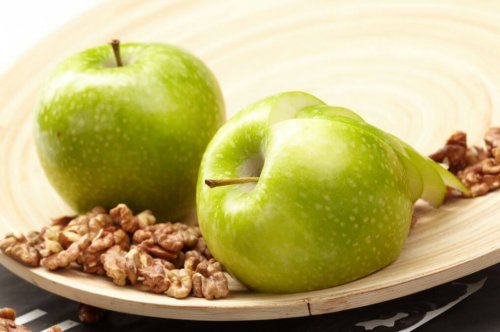Add Grains, Fruits, and Vegetables to all Your Meals

We all know that eating a healthy diet is not always an easy task. Not only do you need time to cook, but you also have to know what products to buy and how to prepare them. Grains, fruits, and vegetables are always part of the meal plan. It’s essential to incorporate these foods into your meals, whether it’s to lose weight or to maintain a balanced diet.
Fruits and vegetables contain far fewer calories and fats than other foods and they provide your body with a large number of vitamins, minerals, and fiber. For their part, grains are low in fat and are very complete foods since they contain nutrients and are rich in fiber; especially if they are whole grains.
Add grains, fruits, and vegetables to your breakfast
To start the day in a healthy way and to stock up on energy by consuming fewer calories, it’s not necessary to stay hungry. Simply replace some of the foods that you normally eat with grains, fruits, and vegetables.

A few banana slices, some pieces of strawberry or apple, and some whole grains, such as oatmeal or bran, in a bowl of yogurt will make a big difference. You can also eat a tortilla with spinach or some mushrooms.
Another good way to incorporate fruits, vegetables, and grains at breakfast is to prepare an orange and carrot juice and add a little oatmeal or bran to it. This recipe is ideal for people who don’t have much time in the morning. With a single glass, you’ll have the energy you need to face the day and it’s also an excellent source of fiber.
Healthy snacks
Although it may seem difficult, adding grains, fruits, and vegetables to your snacks is also possible. A portion of freshly chopped fruits at mid-morning or mid-afternoon is always a great alternative.
If you want something a little more filling, you can also eat a sandwich. Prepare it with a type of bread that contains whole grains, a slice of turkey ham, and add tomato, lettuce, and onions. Besides being very healthy, this snack will keep you from being hungry during the day.

Vegetables at all times
Vegetables are an important part of a healthy diet. They contain few calories, many vitamins, nutrients, and they’re also very varied and versatile. Deciding to prepare different vegetables every day is worth it.
There are many alternatives that you can try too. For example, adding a cup of broccoli or beans to a bowl of soup is a great way to feel fuller with fewer calories.
You can double the number of vegetables in all recipes. The secret is substitution: don’t add vegetables to the normal portion of food, instead, replace other foods with vegetables.
Even if it takes a little time, it’s always good to be creative in the kitchen and try new dishes. Vegetables don’t have to be boring. On the contrary, they are ideal for preparing all kinds of innovative and different recipes.
For example, changing the classic tomato sauce with a sauce made from eggplant, peppers, mushrooms, and tomatoes will bring a fresh sensation to everyday meals.

Whole grains
Whole grains are much healthier than refined grains. Their nutrients are intact because their bran and germ aren’t eliminated. They’re also better sources of fiber and minerals such as potassium, magnesium, and selenium.
Some of the most common whole grains that we can add to our daily diet are barley, brown rice, oatmeal, and wheat bran, among others. An excellent way to include whole grains in meals is to replace white bread with whole wheat bread.
Currently, there’s an immense variety of whole wheat bread on the market, so you only have to choose the one you like the most. This way, you are taking care of your health and aiding the digestive system’s functions.
Another way to incorporate whole grains into meals is to replace bread crumbs with oatmeal or bran cereal. Besides being delicious and different, the dishes will be much healthier. White rice can also be replaced by brown rice or wild rice.
It’s not difficult to follow a healthy and nutritious diet. It’s enough to be mindful of the ingredients that you use.
We all know that eating a healthy diet is not always an easy task. Not only do you need time to cook, but you also have to know what products to buy and how to prepare them. Grains, fruits, and vegetables are always part of the meal plan. It’s essential to incorporate these foods into your meals, whether it’s to lose weight or to maintain a balanced diet.
Fruits and vegetables contain far fewer calories and fats than other foods and they provide your body with a large number of vitamins, minerals, and fiber. For their part, grains are low in fat and are very complete foods since they contain nutrients and are rich in fiber; especially if they are whole grains.
Add grains, fruits, and vegetables to your breakfast
To start the day in a healthy way and to stock up on energy by consuming fewer calories, it’s not necessary to stay hungry. Simply replace some of the foods that you normally eat with grains, fruits, and vegetables.

A few banana slices, some pieces of strawberry or apple, and some whole grains, such as oatmeal or bran, in a bowl of yogurt will make a big difference. You can also eat a tortilla with spinach or some mushrooms.
Another good way to incorporate fruits, vegetables, and grains at breakfast is to prepare an orange and carrot juice and add a little oatmeal or bran to it. This recipe is ideal for people who don’t have much time in the morning. With a single glass, you’ll have the energy you need to face the day and it’s also an excellent source of fiber.
Healthy snacks
Although it may seem difficult, adding grains, fruits, and vegetables to your snacks is also possible. A portion of freshly chopped fruits at mid-morning or mid-afternoon is always a great alternative.
If you want something a little more filling, you can also eat a sandwich. Prepare it with a type of bread that contains whole grains, a slice of turkey ham, and add tomato, lettuce, and onions. Besides being very healthy, this snack will keep you from being hungry during the day.

Vegetables at all times
Vegetables are an important part of a healthy diet. They contain few calories, many vitamins, nutrients, and they’re also very varied and versatile. Deciding to prepare different vegetables every day is worth it.
There are many alternatives that you can try too. For example, adding a cup of broccoli or beans to a bowl of soup is a great way to feel fuller with fewer calories.
You can double the number of vegetables in all recipes. The secret is substitution: don’t add vegetables to the normal portion of food, instead, replace other foods with vegetables.
Even if it takes a little time, it’s always good to be creative in the kitchen and try new dishes. Vegetables don’t have to be boring. On the contrary, they are ideal for preparing all kinds of innovative and different recipes.
For example, changing the classic tomato sauce with a sauce made from eggplant, peppers, mushrooms, and tomatoes will bring a fresh sensation to everyday meals.

Whole grains
Whole grains are much healthier than refined grains. Their nutrients are intact because their bran and germ aren’t eliminated. They’re also better sources of fiber and minerals such as potassium, magnesium, and selenium.
Some of the most common whole grains that we can add to our daily diet are barley, brown rice, oatmeal, and wheat bran, among others. An excellent way to include whole grains in meals is to replace white bread with whole wheat bread.
Currently, there’s an immense variety of whole wheat bread on the market, so you only have to choose the one you like the most. This way, you are taking care of your health and aiding the digestive system’s functions.
Another way to incorporate whole grains into meals is to replace bread crumbs with oatmeal or bran cereal. Besides being delicious and different, the dishes will be much healthier. White rice can also be replaced by brown rice or wild rice.
It’s not difficult to follow a healthy and nutritious diet. It’s enough to be mindful of the ingredients that you use.
This text is provided for informational purposes only and does not replace consultation with a professional. If in doubt, consult your specialist.








